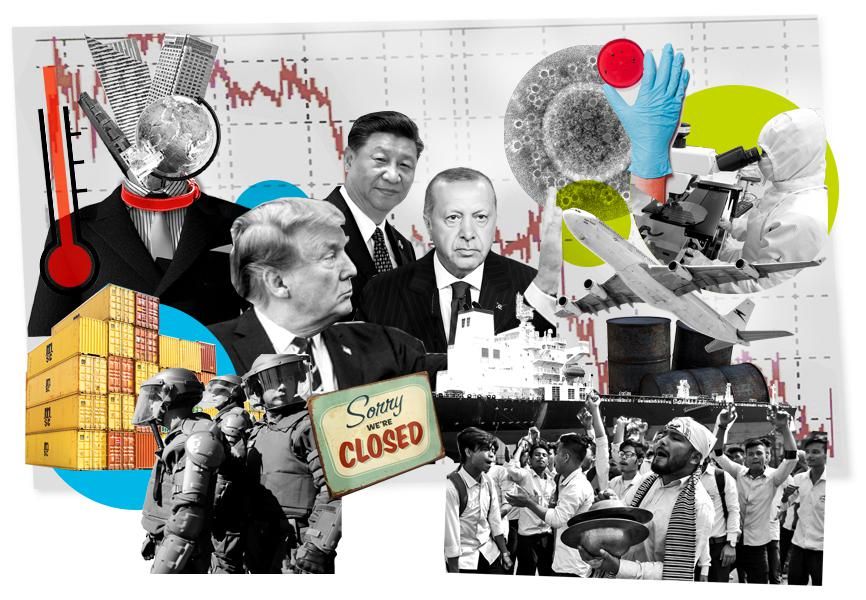December 17, 2020
On January 4, Eurasia Group, our parent company, will publish its annual forecast of the top ten global political risk stories. You'll get full coverage of the 2021 report right here in Signal.
But today we'll look back at the Top Risks list for 2020. You can read the full Eurasia Group report here and the brief summary I wrote for Signal here.
(Full disclosure: Ian Bremmer is my boss, and I've been working on Eurasia Group Top Risks reports for 16 years.)
When the 2020 Top Risks report was published, the coronavirus story was confined almost entirely to Chinese social media. Little did the report's authors, Ian Bremmer and Cliff Kupchan, know that the story that would truly change the world hadn't yet generated much attention outside of hospital workers in Wuhan, China.
And yet… to a remarkable degree, COVID-19 mainly exacerbated the risks that did make the Eurasia Group cut. In fact, the full report was updated in March to account for the global impact of the virus.
Top Risk #1 — titled "Rigged: Who Governs the US?" — centered on the worry that doubts about the legitimacy of the US election would undermine American democracy. Bremmer and Kupchan argued that "Trump will be tempted to sow doubts about the integrity of the election," and that "after the election, the vote could be contested on grounds of tampering, procedural flaws, and/or historically low turnout."
The voter turnout point was off, but the rest of that forecast was prescient, and COVID played a crucial role in shaping the election outcome and in raising doubts about how the vote was conducted. Fortunately, the authors were also right that the "long-term durability of US political institutions" was not at risk, as US courts and the smooth functioning of the electoral college have limited the post-election turmoil.
Top Risks #2 and #3 both focused on relations between the United States and China. The central argument was that the decoupling of the US and China in the technology sphere (Risk 2) would "lead to a more explicit clash over national security, influence, and values" (Risk 3). These processes were well underway before January of last year, but COVID sharpened these differences by giving the US and Chinese leaders powerful new political incentives to sharpen their finger-pointing. COVID had another effect: It encouraged China's President Xi Jinping to become more aggressive on Hong Kong's legal autonomy and other sensitive issues while a distracted world fought to contain the virus.
If there's a major miss in the 2020 report, it's at #8 on the list. That risk – called "Shia Crescendo" – predicted that "feckless US policy in Iran, Iraq, and Syria will drive regional risk." It's worth noting that the report was published just days after the US assassination near Baghdad of Qassim Suleimani, an Iranian general and national hero. But Iran's response has remained muted in 2020, in part perhaps because Iran hoped that Joe Biden would win the US election and move quickly in 2021 to rejoin the Iran nuclear agreement, bolstering Iran's economy.
I encourage you to read the full 2020 report to decide for yourself where Bremmer and Kupchan were right and wrong, and we'll soon turn the page with a new report that looks forward to 2021.
More For You
- YouTube
In this Quick Take, Ian Bremmer breaks down the growing tensions between the US and Iran, calling it "the next area of potential large-scale conflict where President Trump is interested in changing the facts on the ground."
Most Popular
A flood victim stands at her flooded home after weeks of heavy rainfall in Boane District, Maputo, Mozambique, January 19, 2026.
REUTERS/Amilton Neves/File Photo
392,000: The estimated number of people displaced across Mozambique by recent rain-induced floods. Severe flooding in the southern African nation, as well as in South Africa and Zimbabwe, has killed over 100 people.
© 2025 GZERO Media. All Rights Reserved | A Eurasia Group media company.
